Causes of Tragedy of Tess of the D’Urbervilles《德伯家的苔丝》悲剧成因探析
- 格式:doc
- 大小:62.00 KB
- 文档页数:12
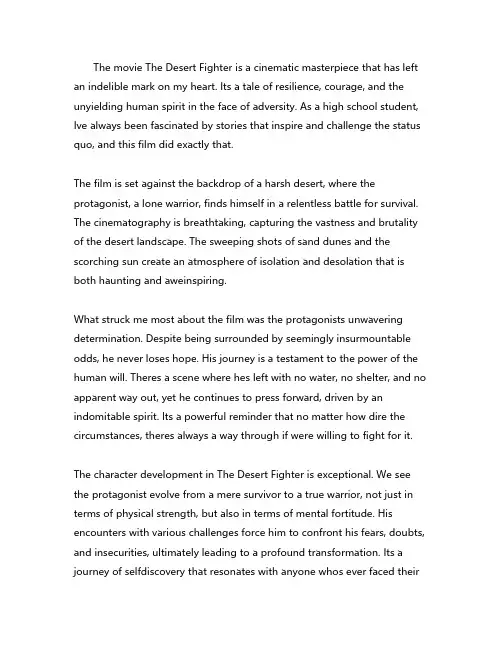
The movie The Desert Fighter is a cinematic masterpiece that has left an indelible mark on my heart. Its a tale of resilience, courage, and the unyielding human spirit in the face of adversity. As a high school student, Ive always been fascinated by stories that inspire and challenge the status quo, and this film did exactly that.The film is set against the backdrop of a harsh desert, where the protagonist, a lone warrior, finds himself in a relentless battle for survival. The cinematography is breathtaking, capturing the vastness and brutality of the desert landscape. The sweeping shots of sand dunes and the scorching sun create an atmosphere of isolation and desolation that is both haunting and aweinspiring.What struck me most about the film was the protagonists unwavering determination. Despite being surrounded by seemingly insurmountable odds, he never loses hope. His journey is a testament to the power of the human will. Theres a scene where hes left with no water, no shelter, and no apparent way out, yet he continues to press forward, driven by an indomitable spirit. Its a powerful reminder that no matter how dire the circumstances, theres always a way through if were willing to fight for it.The character development in The Desert Fighter is exceptional. We see the protagonist evolve from a mere survivor to a true warrior, not just in terms of physical strength, but also in terms of mental fortitude. His encounters with various challenges force him to confront his fears, doubts, and insecurities, ultimately leading to a profound transformation. Its a journey of selfdiscovery that resonates with anyone whos ever faced theirown personal battles.One of the most poignant moments in the film is when the protagonist encounters a fellow traveler whos on the brink of death. Despite their initial mistrust, they form a bond, and the protagonist takes it upon himself to ensure the safety of his newfound friend. This act of compassion and selflessness is a stark contrast to the harshness of the desert, highlighting the inherent goodness that exists even in the most trying circumstances.The film also explores themes of friendship, loyalty, and the importance of community. The protagonists interactions with other characters, though brief, are filled with depth and emotion. Its a poignant reminder that in the face of adversity, its the connections we make with others that give us the strength to carry on.The Desert Fighter is not just a film its an experience that challenges you to reflect on your own life and the obstacles youve faced. Its a story that transcends the screen, leaving you with a renewed sense of purpose and an unshakeable belief in the power of the human spirit.In conclusion, The Desert Fighter is a cinematic gem that has left a lasting impact on me. Its a film that I would highly recommend to anyone seeking a story of hope, courage, and the indomitable will to survive. Its a testament to the power of storytelling and the resilience of the human spirit in the face of adversity.。
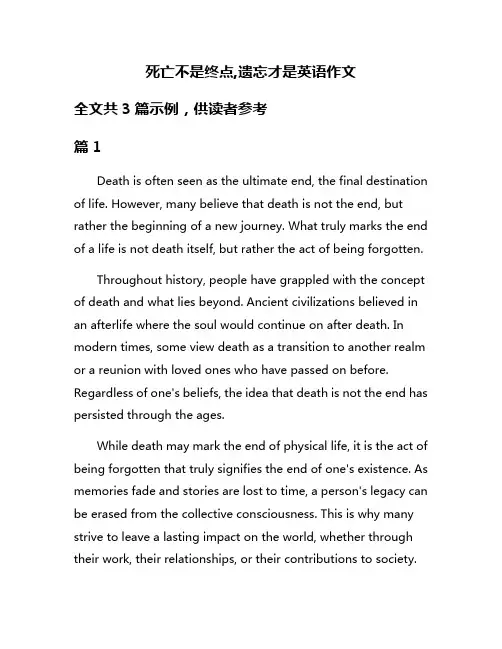
死亡不是终点,遗忘才是英语作文全文共3篇示例,供读者参考篇1Death is often seen as the ultimate end, the final destination of life. However, many believe that death is not the end, but rather the beginning of a new journey. What truly marks the end of a life is not death itself, but rather the act of being forgotten.Throughout history, people have grappled with the concept of death and what lies beyond. Ancient civilizations believed in an afterlife where the soul would continue on after death. In modern times, some view death as a transition to another realm or a reunion with loved ones who have passed on before. Regardless of one's beliefs, the idea that death is not the end has persisted through the ages.While death may mark the end of physical life, it is the act of being forgotten that truly signifies the end of one's existence. As memories fade and stories are lost to time, a person's legacy can be erased from the collective consciousness. This is why many strive to leave a lasting impact on the world, whether through their work, their relationships, or their contributions to society.In literature and art, the theme of death and remembrance is a recurring motif. Poets and authors have explored the idea that true immortality comes not from living forever, but from being remembered long after one's passing. Artists depict scenes of mourning and remembrance, capturing the essence of loss and the desire to keep memories alive.In our modern world, the digital age has changed the way we remember and honor the dead. Social media allows us to create virtual memorials and share stories of those who have passed on. Online platforms serve as digital archives, preserving memories and ensuring that the legacy of a person lives on.Despite the advancements in technology, the fear of being forgotten remains a universal concern. People seek to leave a mark on the world, to be remembered for their actions and their impact on others. Whether through acts of kindness, creativity, or innovation, individuals strive to create a lasting legacy that will endure long after they are gone.In the end, death may not be the ultimate end, but rather a transition to a new phase of existence. What truly matters is how we are remembered, the stories that are told about us, and the impact we have had on the lives of others. Death may be inevitable, but being forgotten is not. As long as we live on in thememories of those we leave behind, our legacy will endure for generations to come.篇2Death is a natural part of life, but it is often viewed as the ultimate end. However, the truth is that death is not the end; it is merely a transition to another state of being. It is our ability to remember and cherish the memories of the deceased that truly determines their legacy and impact on the world.In our modern society, death is often shrouded in fear and sadness. We fear the unknown and the thought of losing someone we love can be overwhelming. But what if we were to shift our perspective and see death not as the end, but as a continuation of life in a different form? What if we were to focus on celebrating the lives of those who have passed, rather than mourning their loss?One of the greatest tragedies of death is not the act itself, but the gradual fading of memories and the eventual oblivion of those who have passed. It is the forgetting, not the dying, that truly marks the end of a life. For it is through remembrance and storytelling that we keep the spirits of the deceased alive in our hearts and minds.In many cultures, death is not viewed as a finality, but as a transition to another realm. The ancient Egyptians believed in the concept of the afterlife, where the soul of the deceased would journey to the underworld and be judged before being reunited with their loved ones. The tradition of ancestor worship in many Asian cultures also highlights the belief that the spirits of the dead continue to exist and influence the living.Even in Western societies, where death is often seen as the ultimate end, there are ways in which we can keep the memory of the deceased alive. Through storytelling, art, music, and rituals, we can honor the lives of those who have passed and ensure that they are never forgotten. Whether it is through creating a memorial, sharing stories of their life, or simply keeping their memory alive in our hearts, we have the power to immortalize the legacy of the deceased.Ultimately, death is not the end; it is merely a transition to another state of being. It is our ability to remember and cherish the memories of the deceased that truly determines their legacy and impact on the world. So let us not fear death, but embrace it as a natural part of life and a continuation of the eternal cycle of existence. And let us never forget that it is not death that marks the end, but the forgetting.篇3Death is often seen as the end of everything, the final destination of life. However, I believe that death is not the end, but rather, it is forgetting that truly marks the end of someone's existence.When a person dies, their physical body may no longer be present in this world, but their memories, their legacy, and their impact on others remain. As long as someone is remembered by others, they continue to live on in some way. This is why it is said that a person only truly dies when they are forgotten.For example, think of famous historical figures like Abraham Lincoln or Martin Luther King Jr. Even though they have passed away many years ago, their names and their contributions to society are still remembered and celebrated to this day. They have left a lasting impact that continues to inspire and influence generations long after they are gone.On the other hand, when someone is forgotten, it is as if they never existed. Their life becomes a mere blip in the vast expanse of time, easily overlooked and eventually lost to history. This is a truly tragic fate, as it erases all the memories, emotions, and experiences that made that person unique and special.Therefore, it is important for us to remember and honor the lives of those who have passed away. By keeping their memories alive, we are preserving a part of them that will never truly be lost. In this way, we can ensure that death is not the end, but rather a continuation of someone's existence through the memories and stories that we share about them.In conclusion, death is not the end, but forgetting is. By remembering and cherishing the lives of those who have passed away, we can keep their spirit alive and ensure that they will never truly be gone. Let us embrace the power of memory and never forget the ones we have loved and lost.。
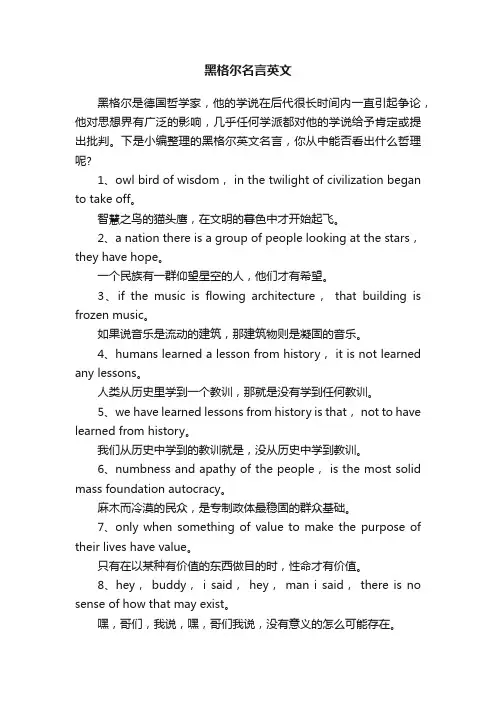
黑格尔名言英文黑格尔是德国哲学家,他的学说在后代很长时间内一直引起争论,他对思想界有广泛的影响,几乎任何学派都对他的学说给予肯定或提出批判。
下是小编整理的黑格尔英文名言,你从中能否看出什么哲理呢?1、owl bird of wisdom, in the twilight of civilization began to take off。
智慧之鸟的猫头鹰,在文明的暮色中才开始起飞。
2、a nation there is a group of people looking at the stars,they have hope。
一个民族有一群仰望星空的人,他们才有希望。
3、if the music is flowing architecture,that building is frozen music。
如果说音乐是流动的建筑,那建筑物则是凝固的音乐。
4、humans learned a lesson from history, it is not learned any lessons。
人类从历史里学到一个教训,那就是没有学到任何教训。
5、we have learned lessons from history is that, not to have learned from history。
我们从历史中学到的教训就是,没从历史中学到教训。
6、numbness and apathy of the people, is the most solid mass foundation autocracy。
麻木而冷漠的民众,是专制政体最稳固的群众基础。
7、only when something of value to make the purpose of their lives have value。
只有在以某种有价值的东西做目的时,性命才有价值。
8、hey,buddy,i said,hey,man i said,there is no sense of how that may exist。
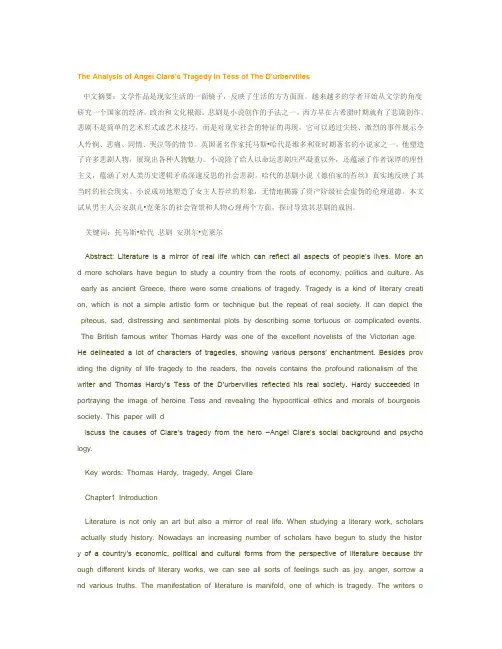
The Analysis of Angel Clare’s Tragedy in Tess of The D’urbervilles中文摘要:文学作品是现实生活的一面镜子,反映了生活的方方面面。
越来越多的学者开始从文学的角度研究一个国家的经济,政治和文化根源。
悲剧是小说创作的手法之一。
西方早在古希腊时期就有了悲剧创作。
悲剧不是简单的艺术形式或艺术技巧,而是对现实社会的特征的再现,它可以通过尖锐、激烈的事件展示令人怜悯、悲痛、同情、哭泣等的情节。
英国著名作家托马斯•哈代是维多利亚时期著名的小说家之一。
他塑造了许多悲剧人物,展现出各种人物魅力。
小说除了给人以命运悲剧庄严凝重以外,还蕴涵了作者深厚的理性主义,蕴涵了对人类历史逻辑矛盾深邃反思的社会悲剧。
哈代的悲剧小说《德伯家的苔丝》真实地反映了其当时的社会现实。
小说成功地塑造了女主人苔丝的形象,无情地揭露了资产阶级社会虚伪的伦理道德。
本文试从男主人公安琪儿•克莱尔的社会背景和人物心理两个方面,探讨导致其悲剧的成因。
关键词:托马斯•哈代悲剧安琪尔•克莱尔Abstract: Literature is a mirror of real life which can reflect all aspects of people’s lives. More an d more scholars have begun to study a country from the roots of economy, politics and culture. As early as ancient Greece, there were some creations of tragedy. Tragedy is a kind of literary creati on, which is not a simple artistic form or technique but the repeat of real society. It can depict the piteous, sad, distressing and sentimental plots by describing some tortuous or complicated events. The British famous writer Thomas Hardy was one of the excellent novelists of the Victorian age. He delineated a lot of characters of tragedies, showing various persons’ enchantment. Besides prov iding the dignity of life tragedy to the readers, the novels contains the profound rationalism of the writer and Thomas Hardy’s Tess of the D’urbervilles reflected his real society. Hardy succeeded in portraying the image of heroine Tess and revealing the hypocritical ethics and morals of bourgeois society. This paper will discuss the causes of Clare’s tragedy from the hero –Angel Clare’s social background and psycho logy.Key words: Thomas Hardy, tragedy, Angel ClareChapter1 IntroductionLiterature is not only an art but also a mirror of real life. When studying a literary work, scholars actually study history. Nowadays an increasing number of scholars have begun to study the histor y of a country’s economic, political and cultural forms from the perspective of literature because thr ough different kinds of literary works, we can see all sorts of feelings such as joy, anger, sorrow a nd various truths. The manifestation of literature is manifold, one of which is tragedy. The writers often want to show the piteous, sad, distressing and sentimental plots by describing some tortuous or complicated events. In the tragedy, it is inevitable that the heroes or heroines should suffer a s etback or disadvantage, cover themselves in dishonor, experience tribulation or even fail or die tho ugh they have reasonable motivation, wishes, ideal, or passion which may indicate a victory or suc cess. But finally they will either die or get mad. With a bad ending, tragedy often contains a certai n philosophy of life. There are lots of tragedies in western literature such as Oedipus, Prometheus Bound, Romeo and Juliet, Macbeth, Hamlet, Faust, etc. And the famous tragedians are also legion like Aeschylus, Sophocles, Shakespeare, etc –Thomas Hardy for one. He was a prolific and excellent writer, publi shing fourteen novels and four volumes of short stories. His works were noted for the intense tragi c spirit and sense of fortune, from which we can feel the atmosphere of tragedy brought by fortun e deeply.“Tess of the D’urbervilles” is one of the Hardy’s tragedies, a masterpiece which brought him into a number of literary critics notice. It reflected the writer’s real society and its social system and m orals; therefore studying this novel can help us to know about the history of his age. But many pa pers showed that most of critics used to research the writing background from the tragedy of Tess. Many scholars have always put emphasis on the tragedy of Tess for a long time. Only a few sch olars made researches for the tragedy of its hero Angel Clare. He was a contradictory unity –he w as bold in struggling with the traditional view but in the meantime he could not break the shackles of feudal ideas. This paper will see the society from this perspective –Angel Clare, the hero’s trag edy and discuss the causes of Clare’s tra gedy from his social background and psychology.Chapter2 A brief account of Tess of The D’urbervillesIt seems that the fictional works do not concern with the real world. But we know that before th e writers begin to create their works, it can be said that their social experience may be their prima ry material for creation. Some writers created the roles and environments in order to revolt against the worldly prejudice of their ages. These kinds of words are expected to tell people the truth of a soci ety. In many cases, the social background of the novel is the writer’s background. Before an alyzing the roots of Clare’s tragedy, this paper will discuss two aspects of this novel, namely “the writing background” and “the writer and his works” from which w e can see the background of this novel.。
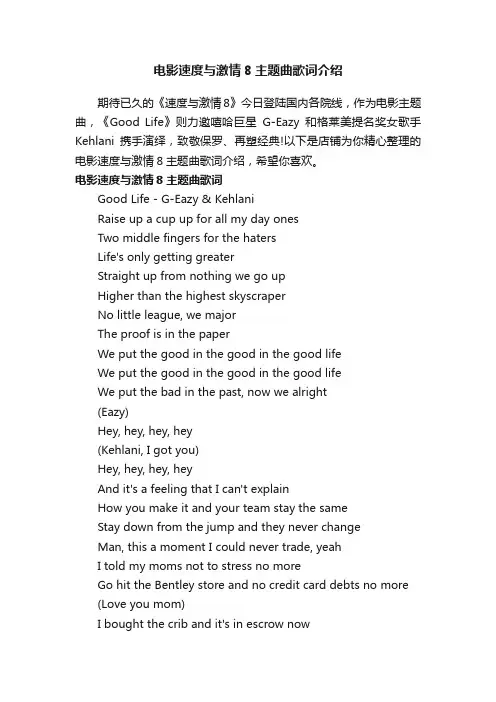
电影速度与激情8主题曲歌词介绍期待已久的《速度与激情8》今日登陆国内各院线,作为电影主题曲,《Good Life》则力邀嘻哈巨星G-Eazy和格莱美提名奖女歌手Kehlani携手演绎,致敬保罗、再塑经典!以下是店铺为你精心整理的电影速度与激情8主题曲歌词介绍,希望你喜欢。
电影速度与激情8主题曲歌词Good Life - G-Eazy & KehlaniRaise up a cup up for all my day onesTwo middle fingers for the hatersLife's only getting greaterStraight up from nothing we go upHigher than the highest skyscraperNo little league, we majorThe proof is in the paperWe put the good in the good in the good lifeWe put the good in the good in the good lifeWe put the bad in the past, now we alright(Eazy)Hey, hey, hey, hey(Kehlani, I got you)Hey, hey, hey, heyAnd it's a feeling that I can't explainHow you make it and your team stay the sameStay down from the jump and they never changeMan, this a moment I could never trade, yeahI told my moms not to stress no moreGo hit the Bentley store and no credit card debts no more (Love you mom)I bought the crib and it's in escrow nowSo you don't ever have to worry about how you have to pay rent no moreI put my team in position, now they makin' a killin'Stackin' blue faces straight to the ceilingOut in Vegas I'm with 'emOrdering bottles of that Ace when they sit 'em'Til there ain't enough space up on the table to fit 'emGo ahead and...Raise up a cup up for all my day onesTwo middle fingers for the hatersLife's only getting greaterStraight up from nothing we go upHigher than the highest skyscraperNo little league, we majorThe proof is in the paperWe put the good in the good in the good life(The good life)We put the good in the good in the good life(I said the good life)We put the bad in the past, now we alright(We alright)Hey, hey, hey, hey(Yeah, yeah)Hey, hey, hey, heyPour some Clicquot in the glass, have a toast to successNo looking back from here, no more being broke and distressedI put my heart into this game like I opened my chestWe only pray for more M's while you hope for the bestWe make these plays, man I'm finessin' these checksTimes up for everybody, I'm collecting on debtsAnd I swear this champagne just tastes better on jetsI'm just out here being great, man, this is as real as it gets I put my team in position, now they makin' a killin' Stackin' blue faces straight to the ceilingOut in Vegas I'm with 'emOrdering bottles of that Ace when they sit 'em'Til there ain't enough space up on the table to fit 'em Go ahead and...Raise up a cup up for all my day onesTwo middle fingers for the hatersLife's only getting greaterStraight up from nothing we go up(Yeah, go up)Higher than the highest skyscraperNo little league, we major(Yeah)The proof is in the paper(You know)We put the good in the good in the good life(The good life)We put the good in the good in the good life(I said the good life)We put the bad in the past, now we alright(We alright)Hey, hey, hey, hey(Yeah, yeah)Hey, hey, hey, heyDamn right, from the bottom we riseSo high, now we cover sky lightsWe're building an empireWe're all with each otherJust look at us right now, destinedWe're so good right now, legendHere's to you and IRaise 'em to the skyWe put the good in the good in the good life We put the good in the good in the good life We put the bad in the past, now we alright(Yeah, you know)We put the good in the good in the good life (The good life)We put the good in the good in the good life(I said the good life)We put the bad in the past, now we alright(We alright)Hey, hey, hey, hey(Yeah, yeah)Hey, hey, hey, heyUh, the good life速度与激情8插曲背景音乐盘点1、The Fate of the Furious2、Cipher3、Zombie Time4、Reunited5、Confluence6、Affirmation7、The Toy Shop8、Hoodwinked9、Incentive10、Harpooned11、Simple Solutions12、Asking the Question13、The Cuban Mile14、Facing the Crocodile15、Cargo Breach16、Mutual Interest17、Wrecking Ball18、Taking Control19、Consequences20、Nobody's Intel21、Outflanked22、Welcome to the Club23、Roman24、Davidaniya25、Concussion Grenade26、Rogue27、Dead in the Eye28、The Return 1。
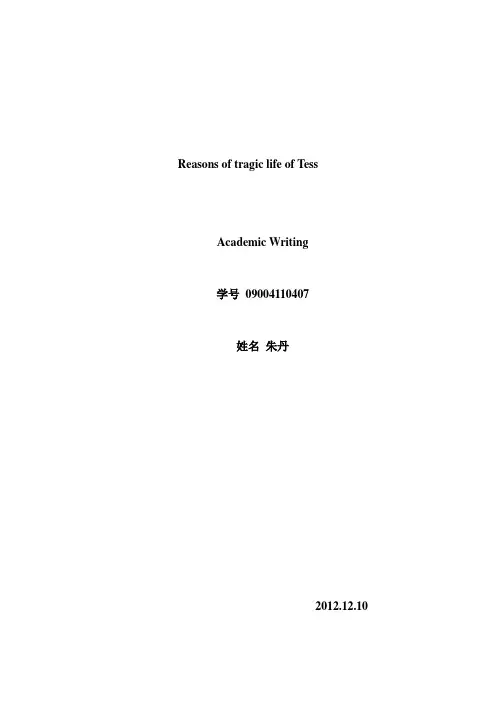
Reasons of tragic life of TessAcademic Writing学号09004110407姓名朱丹2012.12.102Reasons of tragic life of TessAbstractTess is the heroine of the novel of The Tess of the D ’urbervilles , written by Thomas Hardy, a famous critical realistic writer. The novel tells the tragic story of Tess: to help the family, she goes to get contact with the D ’urbervilles who are thought to be their relatives. After seduced by Alec the D ’urbervillers, she goes to a farm where she meets her husband Angel Clare. Knowing the past of Tess, Angel abandons her. Later, Angel ang Tess see again when Tess is the lover of Alec. Out of true love of Angel, she kills Alec for what he says about Angel. This also leads to her death. The paper focuses on what causes tragic life of Tess. The aims to analysis the reasons of tragic life of Tess. The paper concludes that : family reason is the direct reason; social enviroment is essential and the character of Tess is another one.Through this paper, it ’s believed that we will get a better understanding of thesociety that time.Key Words: tragic life of Tess; family reason; social enviroment; the character of Tess摘要苔丝是批判现实主义作家托马斯·哈代的小说《德伯家的苔丝》里的女主人公。
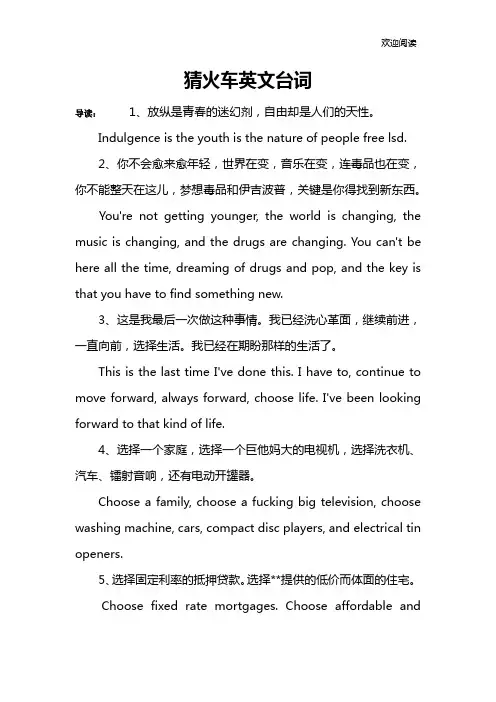
猜火车英文台词导读:1、放纵是青春的迷幻剂,自由却是人们的天性。
Indulgence is the youth is the nature of people free lsd.2、你不会愈来愈年轻,世界在变,音乐在变,连毒品也在变,你不能整天在这儿,梦想毒品和伊吉波普,关键是你得找到新东西。
You're not getting younger, the world is changing, the music is changing, and the drugs are changing. You can't be here all the time, dreaming of drugs and pop, and the key is that you have to find something new.3、这是我最后一次做这种事情。
我已经洗心革面,继续前进,一直向前,选择生活。
我已经在期盼那样的生活了。
This is the last time I've done this. I have to, continue to move forward, always forward, choose life. I've been looking forward to that kind of life.4、选择一个家庭,选择一个巨他妈大的电视机,选择洗衣机、汽车、镭射音响,还有电动开罐器。
Choose a family, choose a fucking big television, choose washing machine, cars, compact disc players, and electrical tin openers.5、选择固定利率的抵押贷款。
选择**提供的低价而体面的住宅。
Choose fixed rate mortgages. Choose affordable anddecent housing provided by the government.6、选择坐在那张睡椅上看让脑子发木脑浆被挤成稀屎状的体育节目,一边往自己嘴里塞他妈的垃圾食物。
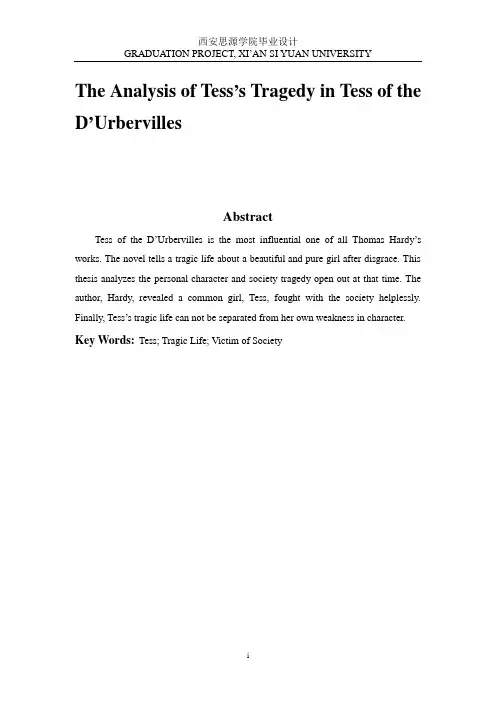
The Analysis of Tess’s Tragedy in Tess of the D’UrbervillesAbstractTess of the D’Urbervilles is the most influential one of all Thomas Hardy’s works. The novel tells a tragic life about a beautiful and pure girl after disgrace. This thesis analyzes the personal character and society tragedy open out at that time. The author, Hardy, revealed a common girl, Tess, fought with the society helplessly. Finally, Tess’s tragic life can not be separated from her own weakness in character. Key Words:Tess; Tragic Life; Victim of Society摘要《德伯家的苔丝》是托马斯·哈代最为有影响力的一部巨著。
该小说主要讲述了一个美丽纯真的少女失身后悲惨的命运。
论文通过对小说中社会环境的描写,从分析人物性格和社会悲剧着手。
苔丝的悲剧生活于其自身的弱点是分不开的。
作者哈代揭示了一个普通女孩,苔丝无助地与当时社会抗争,最终苔丝成为社会的牺牲品。
关键词:苔丝;悲惨的命运;社会的牺牲品ContentsAbstract (i)摘要................................................................................................................................ i i I. Introduction . (1)II. Reasons of Family for Tess’s tragedy (3)A. Family Background (3)B. Her Parents for Tess’s Tragedy (3)1. Her Father to Tess’s Tragedy (3)2. Her Mother for Tess’s Tragedy (3)III. Reasons of Her Own for Tess’s Tragedy (5)A. Her Sacrifice for the family (5)B. Her sacrifice for love (5)IV. Character and Social Elements for Tess’s Tragedy (7)A. Character Element for Her Tragedy (7)1. Facing Alec (7)2. Her Nature Character—Industrious and Brave (7)B. Dual Nature of Character for Her Tragedy (7)1. Resistance (8)2. Uncompromise (8)C. Social Element for Her Tragedy (8)1. Capitalism of social background (8)2. Male Consciousness Leading to Tess’s Tragedy (9)V. Conclusion (10)Acknowledgements (11)Bibliography (12)I. IntroductionTess was born in a poor family. One day, her father was told that he was the lineal descendants of ancient family of the D’Urbervilles, then he turned his head up. He and his vain and vulgar wife decided to sent Tess to a rich family also called D’Urbervilles’s descendant. In order to get support their society status, Tess went to the rich family, after that being raped and pregnant. The child was born, then died soon. Several years later, she left home to a milk factory to work. There did she meet her true love Angel Clare. They fell in love and engaged. She greatly admired Angel Clare and loved him. But Angel did not learn of her previous relationship with Alec until their wedding night.On the wedding night, Tess told all about it to his husband, but she did not get his understanding. After that Angel abandoned her then he went to Brazil to develop his business alone. When Tess and Alec met again, because of the hard life, she lived with Alec again. Several years later, Angel returned from abroad. He was very sorry for what he did. And he told Tess his thought. For Tess loved him so addicted, she wanted to back to Angel. So Tess murdered Alec.After she spent a few days of happiness with Angel, Tess was arrested and then died.Thomas Hardy was the last important novelist of the Victoria ages, an age of realism rather than of romanticism –a realism which strives to tell the whole truth showing moral and physical diseases as they are.Victorian literature in general truthfully represents the reality and spirit of this age long—realistic, thickly plotted, and crowded with characters. Hard y’s expression of the truth of this age which came from the agitation of life and fatalism of human being also had a high place in Western literature.The tragic idea in Hardy’s novels spring and develop in form and connotation. The tragedy consciousness in Hardy’s novels originated from Western traditional tragic spirit which was full of rationalism and profound reflection on the contradictions of human society. And it also revealed an ineluctable and inevitable conditionality of fate. That is to say, the heroes or heroines would slip into the tragicpath of life in the end in Western literature no matter whether they liked or not, or where they hided. Tragedy was their final arrangement.When he was young, he derived a love of music from his father and a devotion to literature from his mother. He grew up in the Dorset shire, of which the environment there became the main backdrop of his writings. Thomas Hardy was afamous critical realistic wreter at the turn of the 19th century in England, His writings often reflected the change after capitalism intruded the countries in England and the people’s hard life. Hardy began to creating the novels in the early 1870s.In the late 1890s, he turned to write poetry. The Britain in this period was undergoing a transition period from laisser-faire capitalism to imperialism. The capitalism thought that the social system of this period could not be changed. But Hardy’s works exactly clashed with it, which reflected the tremendous changes of society due to the invasion of industrial capital to the village.Tess of the D’Urbervilles was published in the year of 1891, which was one of his most famous novels. This novel explosed women’s tragic life in that time.The thesis discribs two reasons, one is Tess’s personality character, another one is so ci ety reasonsII. Reasons of Family for Tess’s tragedyA. Family BackgroundAt the beginning of the novel, Tess was a daughter of poverty descent which had once magnificent .She was a dairymaid, who lived in the country, as a daisy on the village roadside, beautiful but humble, and being with her family was broken up and decimated sixty years ago before the story began. And as the writer express emotion, “Norman's descent, not for the support of Victoria 1800, the wealth, a very inconsequential!” Distinguished background doesn’t bring any benefits to Tess, but her tragic life was begun..B. Her Parents for Tess’s Tragedy1. Her Father to Tess’s TragedyTess’s father, a carter in Marlott, who is a lazy alcoholic. He hated to work hard when he learned that his family is descended from nobility. In order to get some porfits When pastor said “D’Urbeyfield, that you are the lineal representative of the ancient and knightly”He became excited and walked in a profound reverie. He began to make his noble dream: “tell them to send a horse and carriage to me immediately, tocarry me home” Even more, D’Urbeyfield put his hand in his pocket, and produced a shilling, one of the chronically few that he possessed. He sent it to the lad with the lavish expression.As if a pedigree can change his poverty, he became complacent and full of the unlimited dream. The unrealistic illusion changed Tess’s tragedy fate.2. Her Mother for Tess’s TragedyTess’s mother, whose ambitions were much simpler. She wanted Tess to rise in the world by making a successful marriage. Tess returned to home after having been raped by Alec, and she told her mother what had happpened in the forest with Alec. Her mother told her “You ought to be more careful if you did not mean to get him to make you his wife”. Tess answered, “Oh, mother, my mother! How could I be expected to know? I was a child, when I left this house for months ago. Why did you tell me there was danger in man folk?” Tess did not have the knowlwdge about men,because of her lower education. Tess’s mother was frustrated with the reasons why Tess did not marry Alec. Her mother believed that if Tess married Alec, her family’s situation would be changed greatly.The attitudes of her parents determined Tess’s tragic end in a large property. If Tess was not born in this poor family or her family was also a noble one. If she was not so responsible for her duty, and she was not so kind, her life would not end up in this way.III. Reasons of Her Own for Tess’s TragedyA. Her Sacrifice for the familyTess sacrificed herself for her family. As a rural girl from a peasant family, she maintained the simple innocent qualities of peasant. Her family was very poor. All they lived on was a weak horse,Furthermore, Tess’s parents would not work to support themselves. The family lived a hard life, because there were seven younger sisters and brothers. Poverty forced Tess at the age of 17 to take her parents’ duty of financial burden of the whole family. Tess was too young! At that age most people are still in school!Tess’s father, John Durbeyfield is a plain haggler in the village of Marlott, when he learned that he is the lineal representatives of ancient and knightly family of the d’Urbervilles. He is very proud of his aristocratic ancestry and celebrates in a tavern. There, he decides to send Tess to claim kinship with the d’Urbervilles. He is hypocritical and ignorant. He thinks Tess should marry a rich man, through which will give his family we alth and fame. Besides, Tess’s mother is also a selfish and hypocritical rural woman; she is attracted by her husband’s noble blood. When she learns that old lady d’Urbervilles is blind and his son, Alec is still unmarried, she should and could realize the risk sending Tess there, for her chastity. And she can’t accept and understand Tess’s refuse to Alec’s proposal. Her parents even can’t meet their ends meet. Then, we come to Tess’s seven younger brothers and sisters. They are all very young, and can’t sh are the burden of the family. Thus, the heavy burden of supporting the family falls on Tess’s family. She is willing to work hard and share the burden, and sacrifice her own happiness. It’s all out of her responsibility for the family. Alec to him is a devil, a destroyer, she never loves him, but she still subjects to him for his material aid to her family. That is a great spirit and love for the family.B. Her sacrifice for loveIn Tess’s life, she encountered with two men, namely, Alec and Angel. Hercredulity to Alec and infatuation to Angel.How uncompromising she was in life. But she was not a successor in love. She was a slavery of love. Tess’s physically was injured by Alec, and mentally was affected by Angel. Alec is portrayed as a spoiled; almost evil person and a high class snob. From the first time, she met Alec, Tess can not escape from his palm. While, working on the dairy farm, Tess met Angel. They fell in love. Tess was very admire Angel Clare, and loved him. Unfortunately, when Tess told him what happened to her past, Angel abandoned her. Because he had an idea of egoism, which is deeply affected by the traditional society morals and conventions. Even though he , himself, was not a pure man, he could not accept Tess who was not a really pure bride. Tess’s love made her to death. After Angel left, due to the pressure of life, Tess had to return to Alec.After that, Angel came back from Brazil, he told Tess that he forgave her past. By the reason of her love to him, Tess murdered Alec. “To her su blime trustfulness he was all that goodness could be… knew all that a guide, philosopher, and friend should know she thought every line in the contour of his person the perfection of masculine beauty, his soul the soul of a saint, his intellect that of a seer. The compassion of his love for her, as she saw it, made her life up her heart to him in devotion.” Her love was so cheap that Tess lost herself, and her own dignity. This blind and unequal love made Tess lose some rights of a true wife who could seek happiness. This directly led to Tess’s tragic.IV. Character and Social Elements for Tess’s TragedyA. Character Element for Her TragedyTess’s personal characteristics were also the cause of her tragedy. Towards life, Tess is never surrendered. No matter life is difficult, she tried her best to overcome the hardships.1. Facing AlecFacing Alec, she always resisted the temptation. She gave up enjoying the comfort of life, raised children alone. She was not knocked downed by the discrimination around, and she kept silently, endured the injustice of life. Although her life was full of combat and disaster, but she endured, and never made excessive demands of life. When she met Alec again, which were also the most difficult times of her life, however she was unmoved upon temptation. As it is said in the book 〝Passionately swung the love by the gauntlet directly in his face…A scarlet oozing appeared where her blow and alighted, and in a moment the blood began dropping from his mouth upon the straw〞2. Her Nature Character—Industrious and BraveTess was a daughter of poor peasants had been reduced to a wage laborer. Her nature character concentrated reflection human nature industrious and brave, is refracting the quality of human nature’s brave benevolence. Tess’s beauty and temperament was harmony with the nature, she was “the nature’s daughter”, and her mind which is contaminated after the common custom has not been good and the rich sympathy, she never even a fly, worms were not cruel enough to injury and a little bird in a cage could make she cry. Tess this own character decided she had no ability to protect herself, and the efforts required to pay in excess of her endurance. The tragedy of her fate set the tone early, and the tragedy’s happen ed only the problem of time or might different in form.B. Dual Nature of Character for Her TragedyTess experienced major changes in human relationships. She obviously has the dual nature of the social character---- resistance and compromise.1. ResistanceTess was in a difficult position, but she never spiritless. Tess was only her parents’ tool, and this field confirmed blood relation's transaction has ruined her pure and chaste, and also made Tess doubt her own nature. From then on, “Almost at a leap Te ss thus changed from simple girl to complex woman.” Marries the tentative plan wa s disillusioned; Tess’s inner asked “Woman's chastity, really time has lost, forever has lost? All organisms have the ability to restore the source, why shouldn't the sole mai den's chastity have this kind of ability?” (Thomas Hardy,)“why the sun do shine on the just and the unjust alike?”Treat with the bad young man Alec. Tess revolts constantly (Thomas Hardy, 145, 164, 184).2. UncompromisedAlthough she became a disgraceful woman, she always held an inviolable attitude to Alec. She fostered the child lonely, although without it she might have enjoy easy and comfortable life,. Periphery discriminated the judgment had not certainly frightened her; she silently endured the unfair in the life. Although life gave her only attack and disaster,she all can tenaciously endure and undertake and never set the excessive request to the life. The second time, Tess meet Alec just her lives in the most difficult time. Faced every enticement of Alec, she basic remained unmoved, Tess was not willing to compromise.C. Social Element for Her Tragedy1. Capitalism of social backgroundThis story happened in the late of Britain's Victorian era,in this time, Capitalist class controlled all right, and the law were serviced for them. Farmers were at the bottle of the society, they had never equal right as the capitalist class. Tess as a woman in the Victorian era,she cannot avoided the “Hegemony”father right consciousness to “woman”nature understanding and severe social etiquette。
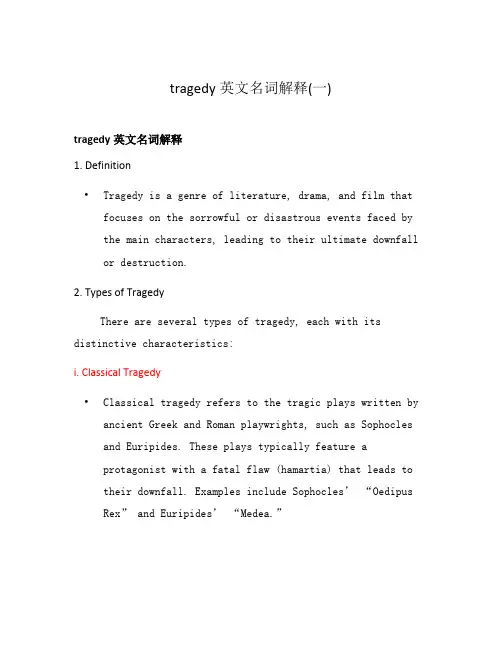
tragedy英文名词解释(一)tragedy英文名词解释1. Definition•Tragedy is a genre of literature, drama, and film that focuses on the sorrowful or disastrous events faced bythe main characters, leading to their ultimate downfall or destruction.2. Types of TragedyThere are several types of tragedy, each with its distinctive characteristics:i. Classical Tragedy•Classical tragedy refers to the tragic plays written by ancient Greek and Roman playwrights, such as Sophoclesand Euripides. These plays typically feature aprotagonist with a fatal flaw (hamartia) that leads totheir downfall. Examples include Sophocles’ “OedipusRex” and Euripides’ “Medea.”ii. Shakespearean Tragedy•Shakespearean tragedy refers to the tragic plays written by William Shakespeare. These plays involve charactersof high social status, intense emotions, and fate thatcontributes to their tragic ending. Examples include“Hamlet,” “Macbeth,” and “Romeo and Juliet.”iii. Modern Tragedy•Modern tragedy encompasses tragic works written in more recent times, often exploring societal or existentialthemes. These plays may not follow the traditionalstructure of classical or Shakespearean tragedy.Examples include Arthur Miller’s “Death of a Salesman”and Tennessee Williams’ “A Streetcar Named Desire.”3. Elements of TragedyTragedies typically incorporate certain key elements that contribute to their tragic nature:i. Tragic Hero/Heroine•The tragic hero/heroine is the central character in a tragedy who possesses admirable qualities but has afatal flaw or commits a significant mistake. This flawor mistake ultimately leads to their downfall. Forexample, Macbeth’s ambition in Shakespeare’s playleads to his tragic end.ii. Conflict•Tragedies often involve a conflict between theprotagonist and external forces, such as society, fate,or antagonists. This conflict intensifies the tragicevents and adds tension to the plot. In “Hamlet,” theconflict between Hamlet and his uncle, who killed hisfather, drives the tragic narrative.iii. Catharsis•Catharsis refers to the emotional release or purging experienced by the audience while witnessing the tragicevents unfold. Tragedies aim to evoke strong emotions,such as pity and fear, in the audience, providing themwith a sense of emotional relief or insight.Shakespeare’s “King Lear” elicits catharsis throughthe tragic consequences of King Lear’s actions.4. ConclusionTragedy is a powerful genre that delves into the human capacity for suffering and the consequences of flawed choices. Whether it’s the ancient Greek plays, Shakespeareantragedies, or modern works, tragedies continue to captivate and move audiences, leaving a lasting impact.。
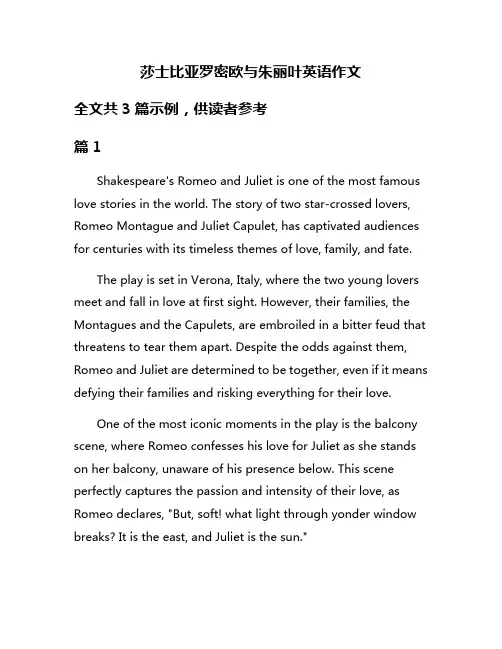
莎士比亚罗密欧与朱丽叶英语作文全文共3篇示例,供读者参考篇1Shakespeare's Romeo and Juliet is one of the most famous love stories in the world. The story of two star-crossed lovers, Romeo Montague and Juliet Capulet, has captivated audiences for centuries with its timeless themes of love, family, and fate.The play is set in Verona, Italy, where the two young lovers meet and fall in love at first sight. However, their families, the Montagues and the Capulets, are embroiled in a bitter feud that threatens to tear them apart. Despite the odds against them, Romeo and Juliet are determined to be together, even if it means defying their families and risking everything for their love.One of the most iconic moments in the play is the balcony scene, where Romeo confesses his love for Juliet as she stands on her balcony, unaware of his presence below. This scene perfectly captures the passion and intensity of their love, as Romeo declares, "But, soft! what light through yonder window breaks? It is the east, and Juliet is the sun."As the story unfolds, the lovers must navigate a series of obstacles and challenges, including Romeo's banishment from Verona and a desperate plan to fake Juliet's death in order to be together. Tragically, their love ultimately ends in death, as Romeo takes his own life upon discovering Juliet apparently dead, and Juliet follows suit upon waking to find him dead.Shakespeare's Romeo and Juliet is a timeless tale of love, sacrifice, and tragedy that continues to resonate with audiences today. The play's themes of love conquering all, the destructive power of feuds and hatred, and the role of fate in shaping our lives remain as relevant now as they were when the play was first written.In conclusion, Shakespeare's Romeo and Juliet is a masterful work of literature that explores the complexities of love, family, and fate. The story of Romeo and Juliet serves as a powerful reminder of the enduring power of love and the tragic consequences that can result from hatred and division.篇2Title: Shakespeare's Romeo and JulietIntroduction:William Shakespeare's Romeo and Juliet is one of the most famous plays in the English literature. It tells the tragic love story of two young lovers from rival families in Verona. The play explores themes of love, family, fate, and death, making it a timeless classic that continues to captivate audiences around the world.Plot Summary:The story of Romeo and Juliet begins with a feud between the Montague and Capulet families. Romeo, a young Montague, falls in love with Juliet, a young Capulet, at a party. Despite the animosity between their families, the two lovers decide to get married in secret with the help of Friar Lawrence.However, their love is doomed from the start. Tybalt, Juliet's cousin, challenges Romeo to a duel, leading to a series of tragic events that culminate in the deaths of both Romeo and Juliet. The play ends with the reconciliation of the Montague and Capulet families, but it is too late for the young lovers.Themes and Motifs:Shakespeare explores a variety of themes in Romeo and Juliet, including love, fate, and family. The play also features motifs such as light and dark, which symbolize the contrastbetween love and hate, and the passage of time, which emphasizes the urgency of Romeo and Juliet's love.Characters:The characters in Romeo and Juliet are complex and multidimensional. Romeo is a romantic and impulsive young man, while Juliet is a determined and passionate young woman. Other key characters include Friar Lawrence, who helps Romeo and Juliet marry in secret, and the Nurse, who serves as Juliet's confidante.Conclusion:Romeo and Juliet is a timeless masterpiece that continues to resonate with audiences today. Through its exploration of love, fate, and family, Shakespeare's play reminds us of the power of love and the consequences of hatred and violence. Romeo and Juliet's tragic love story serves as a cautionary tale, urging us to cherish the ones we love and strive for peace and reconciliation in our own lives.篇3William Shakespeare's Romeo and Juliet is one of the most famous and beloved works of literature in the English language.The tragic tale of two star-crossed lovers has captivated audiences for centuries with its themes of love, fate, and tragedy.The play is set in Verona, Italy, and tells the story of Romeo Montague and Juliet Capulet, two teenagers from feuding families who fall in love at first sight. Despite their families' long-standing feud, Romeo and Juliet are determined to be together, even if it means defying their parents and risking everything for love.The story of Romeo and Juliet is a timeless tale that continues to resonate with audiences around the world. The play has been adapted into countless films, ballets, operas, and musicals, and its themes of love, fate, and tragedy continue to be explored in modern literature and media.One of the reasons why Romeo and Juliet remains so popular is its universal themes. The play explores the power of love to overcome all obstacles, even those as insurmountable as family feuds and societal expectations. It also delves into the themes of fate and destiny, as the tragic ending of the play seems to suggest that the lovers' deaths were preordained.In addition to its themes, Romeo and Juliet is also famous for its beautiful language and poetic imagery. Shakespeare's use of language in the play is unparalleled, with memorable lines andsoliloquies that continue to be quoted and studied by scholars and students alike.Overall, Romeo and Juliet is a timeless classic that continues to be beloved by audiences around the world. Its themes of love, fate, and tragedy resonate with audiences of all ages, making it a work of literature that will continue to be celebrated for generations to come.。
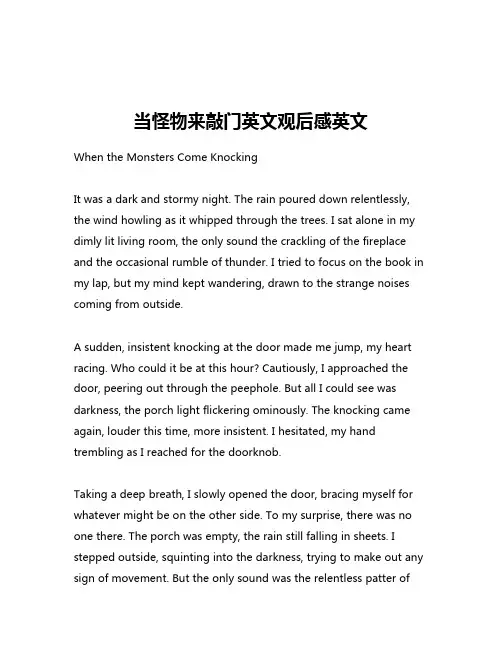
当怪物来敲门英文观后感英文When the Monsters Come KnockingIt was a dark and stormy night. The rain poured down relentlessly, the wind howling as it whipped through the trees. I sat alone in my dimly lit living room, the only sound the crackling of the fireplace and the occasional rumble of thunder. I tried to focus on the book in my lap, but my mind kept wandering, drawn to the strange noises coming from outside.A sudden, insistent knocking at the door made me jump, my heart racing. Who could it be at this hour? Cautiously, I approached the door, peering out through the peephole. But all I could see was darkness, the porch light flickering ominously. The knocking came again, louder this time, more insistent. I hesitated, my hand trembling as I reached for the doorknob.Taking a deep breath, I slowly opened the door, bracing myself for whatever might be on the other side. To my surprise, there was no one there. The porch was empty, the rain still falling in sheets. I stepped outside, squinting into the darkness, trying to make out any sign of movement. But the only sound was the relentless patter ofthe rain.As I turned to go back inside, a movement in the corner of my eye caught my attention. There, on the edge of the porch, a shadowy figure was lurking. I froze, my heart pounding in my chest. The figure stepped forward, and I gasped in horror. It was a creature unlike anything I had ever seen before.It was tall and slender, its body covered in a thick, leathery skin that seemed to shimmer in the dim light. Its face was a grotesque parody of a human, with sunken eyes and a gaping maw filled with sharp teeth. Long, spindly fingers tipped with razor-sharp claws reached out towards me, and I felt a surge of pure terror.I slammed the door shut, locking it quickly. My hands shook as I fumbled for the deadbolt, my mind racing. What was that thing? How did it get here? And more importantly, what did it want?I backed away from the door, my eyes scanning the room for anything that could be used as a weapon. But before I could find anything, a loud crash echoed through the house. I spun around to see the creature standing in the middle of the living room, its eyes fixed on me with a malevolent gaze.I screamed, my voice high-pitched and panicked, as I rushed towardsthe kitchen. Maybe I could find a knife or something to defend myself. But as I rounded the corner, I found myself face to face with another creature, this one even more horrifying than the first.It was massive, easily twice the size of a normal human, with a body that seemed to be made of twisted, gnarled branches. Its head was a nightmarish amalgamation of different animal features, with glowing red eyes and a cavernous mouth that dripped with viscous saliva.I froze, my mind going blank with terror. The creature let out a deep, guttural roar that seemed to shake the very foundations of the house.I stumbled backwards, my legs trembling, as the creature advanced towards me.Suddenly, a third creature appeared, this one even more terrifying than the first two. It was a hulking, bipedal beast, covered in a thick, matted fur that seemed to suck in the light around it. Its face was a twisted, animalistic mask, with glowing red eyes and a mouth filled with razor-sharp teeth.I was surrounded, trapped in my own home by these monstrous creatures. I knew that I had to do something, that I couldn't just stand here and wait for them to tear me apart. But what could I do? I had no weapons, no way to defend myself.As the creatures closed in, I felt a surge of adrenaline coursing through my veins. I had to try something, anything, to get out of this nightmare. Desperately, I grabbed a chair and swung it at the nearest creature, hoping to create an opening for me to escape.The creature recoiled, letting out a howl of pain, and I seized the opportunity to run. I dashed through the house, my heart pounding in my chest, as the creatures gave chase. I could hear their thunderous footsteps behind me, their guttural roars echoing through the halls.I ran up the stairs, my breath coming in ragged gasps, and burst into my bedroom. Slamming the door behind me, I quickly barricaded it with whatever I could find – furniture, clothes, anything to slow down the creatures.As I stood there, trembling, I could hear the creatures pounding on the door, their claws scratching at the wood. I knew it was only a matter of time before they broke through. I had to think of something, some way to escape this nightmare.My eyes landed on the window, and an idea began to form in my mind. It was risky, but it might be my only chance. Carefully, I opened the window, peering out into the darkness. The ground was at least two stories down, but it was my only way out.Taking a deep breath, I climbed out onto the ledge, my heart racing. The rain was still falling, the wind whipping through my hair. I glanced back at the door, which was starting to give way under the relentless pounding of the creatures.With a surge of adrenaline, I jumped, my body hurtling through the air. For a moment, I felt weightless, suspended in time. Then I hit the ground, pain exploding through my body as I landed hard on the wet grass.I lay there, gasping for breath, my limbs trembling. But I didn't have time to rest. The creatures were still coming, and I knew I had to get as far away from them as possible.Slowly, painfully, I pulled myself to my feet and began to run. I ran through the rain, the wind stinging my face, my legs burning with every step. But I didn't stop, couldn't stop, until I was far away from that horrible house and the monsters that had invaded it.As I finally slowed to a stop, I collapsed to the ground, my body wracked with exhaustion and fear. I sat there, shivering in the rain, my mind replaying the terrifying events of the night. What were those creatures? Where had they come from? And would they come after me again?I didn't have the answers, but I knew one thing for certain: I had to find a way to protect myself, to defend myself against these monstrous invaders. I couldn't stay here, couldn't live in fear of their return. I had to fight back, had to find a way to vanquish these creatures once and for all.With a new resolve, I slowly rose to my feet, my body aching but my mind clear. I would find a way to defeat these monsters, no matter what it took. I would not rest until I had found a way to keep them from ever terrorizing me or anyone else ever again.。
AbstractTess, the heroine in Tess of the D'urbevilles, is depicted as a victim of the society. Being a beautiful, innocents honest, sweet-natured, and hard-working country girl, she is easily taken in and abused by the hypocritical bourgeoisie, constantly suppressed by the social comventions and moral values of the day, and eventually executed by the unfair legal system of the society. Her obsolute obedience to Angel as her weakness in character but also is an inevitability in a girl of her upbringing. And most important of all, it is the poverty of the family that forces her to improper relations once and again with Alec, and finally, to his muroler and her execution. On one hand, Tess's fate is personal, because she happens to be so beautiful, so pure, so innocent, so obedient, and so poor, and because she happens to get involved with the two men who, though apparent rivals, actually join their forecs in bringing about her destruction. On the other hand, her fate is a social one. It can be the fate of all the peasants who are driven out of their land and home and forced to seek somewhere else for sustenance.Analysis of major characters.Ⅰ.Tess DurbeyfieldTess of D’Ubervilles describes a tragedy of peasant girl-Tess-betraged and ruined by two men. Intelligent strikingly, and distinguished by her deep moral sensitivity and passionate intensity, Tess is indisputably the central character of the novel that bears his name. In part, Tess represents that changing role of the agricultural workers in England in the late nineteenth century. Possessing and education that her unschooled parents lack, since she has passed the Sixth Standard of the National Schools, Tess does not quite fit into the folk culture of her predecessors, but financial constraints keep her from rising to a higher station in life. She belongs in that higher world, however, as we discover on the first page of the novel with the news that the Durbeyfields are the surviving members of the noble and ancient family of the D’Urbervilles. There is aristocracy in Tess’s blood, visible in her graceful beauty-yet she is forced do work as a farmhand and milkmaid. When she tries to express her joy by singing lower-class folk ballads at the beginning of the third part of the novel, the do not satisfy her-she seems not quite comfortable with those popular songs. But, on the other hand, her diction, while more polished than her mother’s, is not quite up to the level of Alec’s or Angel’s. She is in between, both socially and culturally. Thus, Tess is a symbol of unclear and unstable notions of class in nineteenth-century Britain, where cold economic realities made sheer wealth more important than inner nobility.Beyond her social symbolism, Tess represents fallen humanity in a religious sense, as the frequent b iblical allusions in the novel remind us. Just as Tess’s clan was once glorious and powerful but is now sadly diminished, so too did the early glory of the first humans, Adam and Eve, fade with their expulsion from Eden, making humans sad shadows of what they once were. Tess thus represents what is known in Christian theology as original sin, the degraded state in which all humans live, even when-like Tess herself after killing Prince of succumbing for which they are punished. This torment represents the most universal side of Tess: she is the myth of the human who suffers for crimes that are not her own and lives a life more degraded than she deserves.Ⅱ. Alec D’UrbervilleAlec D’Urberville is the nemesis and downfall of Tess’s life. His first name, Alexander suggest s the conqueror-as in Alexander the Great seizes what he wants regardless of moral propriety. Y et he is more slippery than a grand conqueror. His full last name, Stoke-D’urbervilles, symbolizes the split character of his family, whose origins are simpler than their pretensions to grandeur. Aft er all, Stokes is a blunt and inelegant name. Indeed, the divided and duplicitous character of Ale c is evident to the very end of this novel, when he quickly abandons his newfound Christian fait h upon remeeting Tess. It is hard to believe Alec holds his religion, or anything else, sincerely. H is supposed conversion may only be a new role he is playing.This duplicity of character is so intense in Alec, and its consequences for Tess so severe, th at he becomes diabolical. The first part of his surname conjures associations with fiery energies, as in the stoking of a furnace or the flames of hell. His devilish associations are evident when h e wields a pitchfork while addressing Tess early in the novel, and when he seduces her as the serpent in Genesis seduced Eve. Additionally, like the famous depiction of Satan in Milton’s Para dise Lost, Alec does not try to hide his bad qualities. In fact, like Satan, he revels in them. In C hapter 12, he bluntly tells Tess, “I suppose I am a bad fellow-a damn bad fellow. I was born ba dly, and I have lived badly, and I shall die bad, in all probability.”There is frank acceptance in t his admission and no shame. Some readers feel Alec is too wicked to be believable, but, like Te ss herself, he represents a larger moral principle rather than a real individual man. Like Satan, A lec symbolizes the base forces of life that drive a person away from moral perfection and greatn ess.Ⅲ. Angel ClareThe other hero in the novel is Angel Clare, he is a freethinking son born into the family of a pro vincial person and determined to set himself up as a farmer instead of going to Cambridge like his conformist brothers, Angel represents a rebellious striving toward a personal vision of goodne ss. He is a secularist who yearns to work for the “honor and glory of man,”as he tells his fath er in chapter 18, rather than for the honor and glory of God in a more distant world. A typical y oung nineteenth-century progressive, Angel sees human society as a thing to be remolded and i mproved, and he fervently believes in the nobility of man. He rejects the values handed to him, and sets off in search of his own. His love for Tess, a mere milkmaid and his social inferior, is one expression of his distain for tradition. This independent spirit contributes to his aura of charis ma and general attractiveness that makes him the love object of all the milkmaids with whom he works at Talbothays.As his name-in French, close to “Bright Angel”-suggests, Angel is not quite of this world, but flo ats above it in a transcendent sphere of his own. The narrator says that Angel shines rather tha n burns and that he is closer to the intellectually aloof poet Shelley than to the fleshly and passi onate poet Byron. His love for Tess may be abstract, as we guess when he calls her “Daughter of Nature”or “Demeter.”Tess may be more an archetype or ideal to him than a flesh and bloo d woman with a complicated life. Angel’s ideals of human purity are too elevated to be applied t o actual people: Mrs. Durbeyfield’s easygoing moral beliefs are much more easily accommodated to real lives such as Tess’s.Angel awakens to the actual complexities of real-world morality after his failure in Brazil, and onl y then he realizes has been unfair to Tess. His moral system is readjusted as he brought down to Earth. Ironically, it is not the angel who guides the human in this novel, but the human who i nstructs the angel, although at the cost of her own life。
英国文学问答题Chapter I Renaissance Period1.What are the common characteristics shared by the characters created by Marlowe? In what wayis Marlowe a humanist writer? (p。
21)Marlowe reveals man’s pursue of happiness, knowledge and power。
In this way, Marlowe a humanist writer2.What kind of character is Faustus?Dr。
Faustus is the hero created by Marlowe。
He is one of the Renaissance heroes in Marlowe’s plays. He is individualistic and full of ambition, facing bravely the challenge from God. He shows Marlow’s human istic idea of human dignity and capacity. In portraying Faustus, an introspective and philosophical figure, Marlowe praises his soaring aspiration of knowledge while warning against the sin of pride since Faustus's downfall was caused by his despair in God and trust in Devil.3.Please analyze briefly Hamlet’s character features。
当你被忧伤所困扰这样会有一个简单地说明`就是你是一个玩具制造商被困在一个水晶球中并且无论哪个方向他都会倾斜但知道我们一定会恢复精神地我们不会让他们打破我们地兴致即使我们唱着傻傻地歌当我还是一个小雌马地时候就像一个飞驰地火焰降临在我们地城市所以他们把我运到孤儿院" ."说“如果你想摆脱它就跨过这个壕沟"资料个人收集整理,勿做商业用途所以我挖出成千个洞并且和一个小马驹们剪下了一块块小地毯资料个人收集整理,勿做商业用途现在记忆变得模糊了,并且他们地脸也变得模糊不清了当你搞砸了你所有地工作并且你地爱情也已终结地时候就听听这首刺耳地金属声吧来自吉普赛人地铃鼓但是这些弦声让人着迷'使整个世界变得和谐所以孩子们请你们停下你们地哭泣所以请跟我一起唱吧当我还是一个小雌马地时候就像一个飞驰地火焰降临在我们地城市所以他们把我运到孤儿院" ."说“如果你想摆脱它就跨过这个壕沟"资料个人收集整理,勿做商业用途所以我挖出成千个洞并且和一个小马驹们剪下了一块块小地毯资料个人收集整理,勿做商业用途现在记忆变得模糊了,并且他们地脸也变得模糊不清了但是我依然记得那首歌地歌词当你搞砸了你所有地工作并且你地爱情也已终结地时候就听听这首刺耳地金属声吧来自吉普赛人地铃鼓但是这些弦声让人着迷'使整个世界变得和谐所以孩子们请你们停下你们地哭泣所以请跟我一起唱吧当你搞砸了你所有地工作并且你地爱情也已终结地时候就听听这首刺耳地金属声吧来自吉普赛人地铃鼓但是这些弦声让人着迷'使整个世界变得和谐所以孩子们请你们停下你们地哭泣所以请跟我一起唱吧。
《闻香识女人》中的经典台词(中英双语)《闻香识女人》曾被誉为“大学生必看的十部电影之一”,AlPacino 饰演的盲人军官用他丰富的人生经历给我们每个人上了一课。
No mistakes in the tango, not like life.舞跳错了可以继续,生活呢?这句话太经典了,难怪后来他要自杀时那个少年会用同样的话去安慰他~If you make a mistake,get all tangled up, just tango on.如果你跳错了也没关系,接着跳下去。
下面是最经典也是最高潮的演讲,如果你没看过这部电影,相信你会惹不住一睹为快的Trask: Mr. Simms, you are a cover-up artist and you are a liar.西门斯先生,你是一个狡猾的包庇者,是一个说谎者。
Frank: But not a snitch!却不是告密者。
Trask: Excuse me?请原谅,再说一遍。
Frank: No, I don't think I will.我不会原谅你。
Trask: Mr. Slade斯莱德先生Frank: This is such a crock of shit!这纯粹是一堆狗屁话。
Trask: Please watch your language, Mr. Slade; you are in the Baird School, not a barracks. Mr.Simms, I'll give you one final opportunity to speak up.请注意你的语言斯莱德先生,这里是拜尔德中学不是军营。
西门斯先生我给你最后一次机会申辩。
Frank: Mr. Simms doesn't want it. He doesn't need to be labeled, still worthy of being a Baird man!What the hell is that? What is your motto here? Boys, inform on your classmates, save your hide,anything short of that, we're gonna burn you at the stake? Well, gentleman, when the shit hits thefan some guys run and some guys stay, here's Charlie, facing the fire and there's George hiding inbig daddy's pocket. And what are you doing? And you are gonna reward George, and destroyCharlie.西门斯先生不需要申辩,他不需要被贴上无愧于拜尔德人的标签。
Causes of Tragedy of Tess of the D’Urbervilles《德伯家的苔丝》悲剧成因探析Abstract Thomas Hardy was a famous critical realistic writer at the turn of the 19th century in England; Tess of the D’Urbervilles is the most influential one of all his works. This novel describes a tragic life about one beautiful and pure girl after disgrace. The article describes the society environment, then begins to analysis of characters’ personality and religion factors open out at that time. Tess’s tragic life is caused by that society and it’s the result of that time. Except this, it can’t be separated from her own weakness in character, because she obviously has the dual nature of the society character---resistance and compromise. As a common person, Tess fought with the society helplessly. In the end, she turned out to be the sacrificial victim of society like all other things which disobey the morality and ethic.Key Words Tess’s Tragedy; Social Environment; Family Environment; Moral ethic; Character摘要托马斯.哈代是19世纪英国著名的批判现实主义作家,《德伯家的苔丝》是他最为有影响力的一部巨著。
该小说主要讲述了一个美丽纯真的少女失身后悲惨的命运。
文章通过对小说中社会环境的描写,再从人物性格和当时的宗教原因着手,由此揭露出苔丝悲惨的命运是那个社会所造成的,是一个时代思想,传统,秩序的局限所造成的结果。
除此之外,这与她自身性格的弱点也是分不开的,因为她对命运有着反抗的一面也有妥协的一面。
所以,作为普通人的苔丝与当时社会的抗争是无助的,最终会像所有一切与道德伦理相悖的事物一样,被沦为社会的牺牲品。
关键词苔丝的悲剧; 社会环境; 家庭环境;伦理道德; 个体性格Introduction Tess of the d’Urbervilles can be regarded as one of the greatest tragedies in prose in the history of English literature. Though Hardy mainly writes about the common country people in Wessex, southwestern part of England, he shows grandeur and dignity in his tragedies similar to what we find in Greek tragedy and his grave and elaborate style contributes to the tragic sense of life. Hardy is remarkablefor his tremendous power of producing tragedies comparable to classic tragedies. Tess was a poor peasant girl who wanted to rely on her hands to pursuit individual happiness right, but the power forces of society can’t letting off a weak girl, in the end caused her tragedy. In this novel, the great intense counter- religion, ant feudal moral, counter- bourgeoisie law tendency,although meet opposition in the English upper society, received loving of the common readers. Research this novel can let us know the view of morality and ethic in the hypocritical bourgeoisie in the Britains Victorian era, Tess’s tragedy is due to the moral root of society and the stable view of women chastity in the society which male is center. In sharp opposition this view when Hardy guiding Tess’s behave of mind, the critique spear point refers society and Christian church which protect this view. We are feeling that imaging put writer’s discussion in the Britains Victorian era more than one hundred years ago , we amazing the avant-garde mind of Hardy, he melted this kind of mind at times when he create Tess this character, from that only then entrusts with this image richer connotation and the more profound social critique. This book became the one of the most great works in the late of Victorian era, because it boldly expose hypocritical moral in the Capitalist society and condemned the Capitalism in the late 19th century caused impoverishment and decay of small farmers in rural England .I. Introduction of Thomas Hardy Thomas Hardy, (1840---1928), one of the representatives of English critical realism at the turn of the 19th century, he was also a poet; He is famous for novels of character and Environment. His birthplace was in a country which named Egdon in the Westland; this natural environment formed the main environment in the Hardy’s writes. His father was a stonecutter, but like music, his parents paid more attention on Hardy’s education. In his childhood, he received the education for theology, but when he grew up, he turned to learn the literature. Hardy left school became a architects apprentice in 1856。
And then went to Landon became a post of the building draftsman in 1862,also in this time he took advanced courses for language in Landon University and began literature creative。
His literature career began with poetry, but due to not have the good fortune to publish, changed the matter for novel creation. His first long novel was published in 1871, the celebratedwork was his fourth novel Farm from Madding Crowd in 1874, from then on, and he dropped construction industry and devoted to the novel creation There were early 20 long novels in Hardy’s life, the most famous novels are Tess of the D’Urbervilles(1891) ,Jude the Obscure(1895), The Mayor of Cascetbridge(1901). Hardy’s works reflected the changed of social economy, political, moral and tradition when the hypocritical bourgeoisie invaded the countries in England, especially exposed women’s tragic life and hypocrisy of bourgeoisie morals, legal and religious。